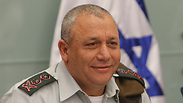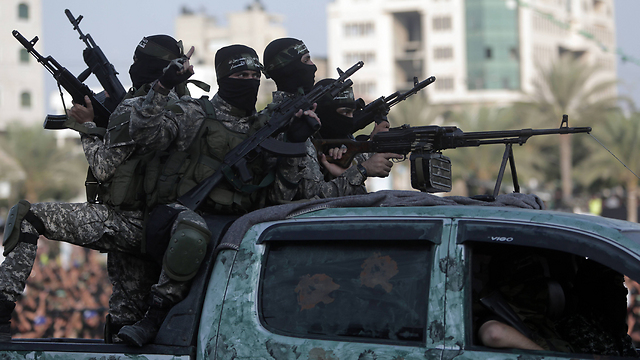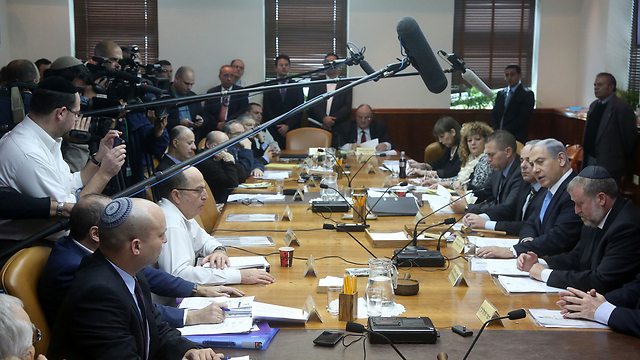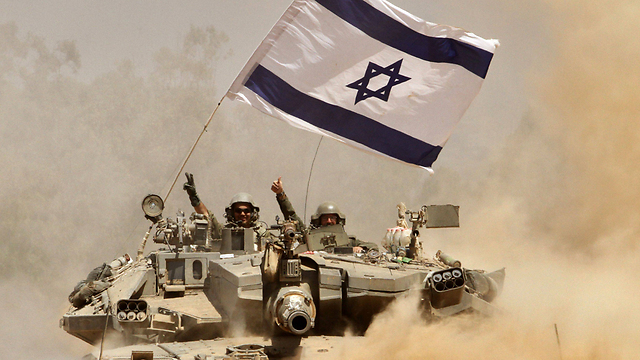
IDF chief details army's national security strategy
In document released to the public, Eisenkot states that while Israel won't initiate wars, if war is forced upon it, the IDF will go on the offense rather than defense; also differentiates between 'wartime' and 'emergency' situation, stressing the need to define clear objectives to each military campaign.
In an unprecedented move, IDF Chief of Staff Gadi Eisenkot released a document to the public on Thursday defining and detailing the army's national security strategy.
The document details what can be expected from the IDF during three types of situations: Routine time, emergency situations and wartime.
Based on this division, conflicts like Operation Protective Edge and Operation Pillar of Defense are considered confrontations limited in their scope and are therefore define as "emergency," rather than "war."
This means these confrontations were meant to bring Israel "back to a situation of calm, without striving for an immediate strategic change," so the IDF cannot be expected to bring down the Hamas regime in Gaza in such a military campaign, unless the political leadership tells it otherwise.

"The basic assumption is that the enemy cannot be defeated with defensive fighting, so an offense is required to achieve clear military results," the document states.
The definition of the "enemy" has also been altered. As the threat of an all-out war against another state or several other states is on the decline, the document redefines the main threat as coming from military organizations like Hamas and Hezbollah or terror organizations that are not affiliated with any one country, like global jihad and the Islamic State.
Because of that, the IDF will favor fighting with smaller forces that can maneuver quickly and easily between different fronts, over large and stationary forces. This statement comes in the midst of the public debate over the defense budget and the IDF's attempt to present itself as a dynamic army that can become more efficient.
While Hezbollah, Hamas and the Islamic State are all mentioned, Iran is missing almost entirely from the document. Tehran appears as an example of a distant enemy state and is mentioned one more time beyond that - as the puppet master behind Hezbollah and Hamas.
The Iranian nuclear threat, which is presented by the political leadership as the biggest existential threat Israel is facing, is not mentioned - possibly because the army's strategy on that issue is too classified to appear in a public document, or because the agreement signed between Iran and world powers is seen as mitigating the threat.
The document also determines that the chief of staff, being the army's commander-in-chief, would be the only one in contact with the political leadership, and it would be his responsibility to translate the government's instructions into operational orders.
This declaration emphasizes the fact the IDF is subordinate to the government and is only implementing the instructions given to it by the public's representatives.
Other principles detailed in the document include the importance of the strategic cooperation with the United States, strengthening Israel's standing in the region and maintaining Israel's relative advantage over its enemies.In addition to the document released to the public, there is another top secret document, much more detailed, about how the IDF will implement its strategy.
A historic milestone
The document, titled simply "The IDF's strategy," is a historic milestone in Israel's national security. For the first time, the IDF is defining its defense worldview and using that to determine how to act.
But most importantly, this document clarifies to the political leadership what is reasonable for them to demand and expect from the IDF, while at the same time demanding the prime minister and security cabinet to define exactly what the objectives of using military force in each instance are, what restrictions and constraints are imposed on the army, and what are the desired results.
This has never happened before. For the first time, the army is telling the political leadership what it needs from it in order to act effectively.
It is safe to assume that the prime minister, and mostly the defense minister, approved every letter and comma in that document before they allowed the chief of staff to declare it as a binding document and release it in full to the public.
The fact the defense minister approved the document is also a historic precedent, and Moshe Ya'alon should be given credit for doing something no defense minister had done before him. Some defense ministers appointed committees tasked with formulating Israel's security positions, but such positions have never been agreed upon and certainly not released to the public.
At the beginning of the document, the IDF defines the national goals and the principles of Israel's national security perception, which is similar to the principles outline by the Meridor Committee in 2006. The conclusions of the Meridor Committee, appointed by former defense minister Shaul Mofaz, were never released, not even to all members of Knesset.
The need to finally release a coherent document detailing the IDF's national security perceptions arose after the Second Lebanon War in 2006 and Operation Protective Edge in 2014. Both wars revealed failures that were the result of having no clear objectives for the war, as well as no clear definitions of what a "decisive victory" entails, what is considered a "victory," what should the army aim for and what roles do the IDF and political leadership each have.
The document answers all of these questions. For example, it clearly states that the political leadership can present the IDF with two kinds of demands while fighting an enemy that is not a sovereign state - meaning Hamas, Hezbollah or the Islamic State: A full and clear decisive military victory against the enemy, or a limited and defined strike against the enemy.
During Protective Edge, for example, the political leadership demanded a limited strike against the enemy, rather than a decisive victory. With this document, the IDF wants to prevent some of the criticism that would follow the next round of fighting with regards to whether or not the objective of the military campaign has been reached.
While the IDF chief clearly states that he will do whatever the political leadership instructs, he also goes into great detail about what the political leadership needs to do so he, as the commander of the army, can provide it with the desired outcome.
Another reason for the document's release to the public is to match the Israeli public's expectations with what the army can and cannot do. When fighting enemies who are not states, the IDF faces constraints. For example, Israel needs to have international legitimacy for the campaign, otherwise IDF troops and commanders fighting among civilian populations, as well as the political leadership, could be declared war criminals.
With this document, Eisenkot also seeks to show that the IDF is not set on past dogmas and does not use billions in tax payer money to prepare for previous wars, rather than the wars to come.
It is also an attempt to show the army is attuned to public opinion and that it understands that allocating resources to education, health and welfare is just as important as allocating resources to security.













